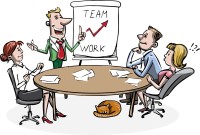- Home
- Business Processes
- Industry Knowledge
- Aerospace Industry
- Automotive Industry
- Banking Domain
- BFSI Industry
- Consumer/ FMCG Industry
- Chemicals Industry
- Engineering & Construction
- Energy Industry
- Education Domain
- Finance Domain
- Hospitality Domain
- Healthcare Industry
- Insurance Domain
- Retail Industry
- Travel and Tourism Domain
- Telecom Industry
- Leadership Skills
- eLearning
- Home
- Leadership
- Problem Solving
- Time Management Skills
Time Management Skills
How often do you have a plan for how you are going to spend your day but you aren't able to complete the tasks on your plan because of unimportant tasks, interruptions, or your own procrastination? Wouldn't it be great to be able to manage your schedule and your time while avoiding, or at least controlling, these time stealers? Learn the strategies to manage your schedule while still handling interruptions and demands on your time.
Meaning of Time
What time means to you and how to identify some of the ways in which you can manage it more effectively?
If you wish to become an effective manager of time you must first understand the nature of what you are attempting to manage. Time in this context is not to be defined philosophically. Most simply, it is of finite duration distinct from eternity. The expression 'time' in the English language as well as in other languages is used in different ways. Spend a few minutes writing down some ideas of what the following phrases mean to you:
- At the same time
- On-time
- Time off
- At times
- From time to time
- Timeless
- In no time
- Timely
- In time
A reflection on the above phrases will enable you to focus on the nuances of meaning that underpin their use in actual contexts. You have probably now got a clearer idea of time. Time in fact is an intangible concept or a paradox. You never have enough time but you have all the time that is available. It is a resource, but if you don't use it, it will disappear and you will never be able to catch hold of it, once gone. You can't increase its quantity, but you can ensure that you use it on things that are important to you.
You might have realized that time is a personal concept which means there is no right or wrong perception of time. Learning to manage time requires commitment and depends on how you approach various activities. Your approach will be influenced by the assumption you make about the nature of your work and the environment in which you live and work. Some assumptions will generally be more useful than others for managing your time effectively.
Meaning of Time Management
One of the most essential skills required by an effective manager and every professional relates to managing the time available and prioritize the long term and short-term goals.
Time management is a process of determining the quality and quantity of work output i.e. the effective utilization of time in performing various activities in the organization. Time management is the discipline of organizing, allocating, and controlling the time you use for activities in such a way that you achieve your desired results.
You as an employee have to perform your activities according to your job description. Your important duty is to see that all the activities are performed as per the job description and with the time limit assigned to the job. Time management will help you to perform your job more effectively and efficiently.
The flow of Time is Unidirectional
Like other resources, 'time' is also an important resource that has got a unique character of having a constant unidirectional forward flow. Time passed, cannot be regenerated nor it can be stored to be utilized later on when needed.
Adequate input of all other resources does not necessarily guarantee achievement up to expectation, if during the planning and implementing all possible efforts were not undertaken to complete the various component tasks in targeted time by effectively utilizing the same.
Why Time Management?
Time management is the discipline of organizing, allocating, and controlling the time you use for activities in such a way that you achieve your desired results. Time is a very valuable resource. The first step towards improving time utilization is to determine how available time is spent on different types of activities. Although managers understand that time is their scarcest resource, few actually take time to get a ‘birds-eye’ view of how they actually spend their time and keep a track of how the priorities they say are the most important fit with the actual way they spend their time. It highlights how to control your time so that you can optimize your productivity. Time management helps us to:
- To provide quality time to your responsibilities
- To decrease expenses through work transformation
- To see that all the staff spends their time as per the activities listed in their job description
- To measure the work output and facilitate quality customer focus
Time management is simply a way of using time effectively. Working faster or working longer are poor strategies for managing time. It is more sensible to identify your priorities and then choose the activities accordingly. In fact managing time is about managing yourself. It is about adapting to a given situation so that you can get the most out of your time for you to do this, you must accept that you can influence and ultimately control the environment in which you live and work. You must learn to spend your time wisely.
Related Links
You May Also Like
-
Storming Stage of Team Development
Storming is the second stage of team development and this stage is characterized by a bid for power and inter-personal conflicts. Learn the key factors that occur in the storming stage and the strategies that a team leader can adopt to pass this stage of high winds
-
Collaborative leadership is all about collaborative problem-solving and decision-making or can also be defined as the leadership of a collaborative effort. . The term started to appear in the mid-1990s in response to the formation of long term public-private partnerships to rebuild public infrastructure. Learn how you can use principles of collaborative leadership to enhance your leadership skills for being an effective leader.
-
Authentic leadership is an approach to leadership that emphasizes building the leader's legitimacy through honest relationships with followers which value their input and are built on an ethical foundation. The authentic leader acts upon his or her values and beliefs, and inspires others to do the same, is committed to know and develop oneself. Are you committed to developing yourself; know your motivations and the purpose of your leadership? Read this article to know more about authentic leadership style and discovering your authentic self.
-
Effective Business Communication
Communication is all about getting the message across correctly. To make this happen, you need to have good speaking skills and good writing skills. If you have these skills coupled with good listening skills and interest in reading, you have all the potential to be a good communicator. What things should the leader take into consideration to be more effective with interpersonal communication?
-
Building Perfect Creative Team
One misconception around creativity is that creative act is essentially solitary. Most of the world's important inventions resulted not from the work of one lone genius, but from collaboration of a team with complementary skills. Managers should build teams with the ideal mix of traits to form a creative group and then establish the conditions that make creativity much more likely to occur.
-
Tips for Effective Time Management
After studying and analyzing how time is spent, why time is wasted, and where time is wasted you need to decide about the changes required for effective utilization of time. For this purpose, a large number of remedial measures can be taken by you. The first and foremost determinant of a planned and purposeful utilization of time is to develop consciousness of the value of time at all levels of the organization. Planning, goal setting, and defining priorities are concerns to addressed immediately.
-
In its simplest sense, decision-making is the act of choosing between two or more courses of action. Decision making is a key skill in the workplace and is particularly important if you want to be an effective leader. When decisions have to be made, there are several stages that you should go through to reach a practical solution. Understand the meaning and importance of decision making and how to look at it as a process.
-
Laissez-faire is a style of leadership that affords the group members a great deal of independence. Tasks are delegated to the group members and they are responsible to see the project through to fruition. Research has shown that this style of leadership leads to the lowest levels of productivity. This article explains this style and covers the implications of having a hands-off approach and the situations where this style could be effective.
-
In this study of power, Raven identified five bases of power as coercive, reward, legitimate, referent, and expert. The 5 Types of Power can help you decide when it is appropriate to use a particular type of power in important situations. Leadership involves authority and it is very important for leaders to understand what type of power they're using.
-
Creating Highly Effective Teams
How do we create effective teams? What comes to mind when you think about an effective team? High performing teams exhibit accountability, purpose, cohesiveness, and collaboration. It is a team that works seamlessly as a whole. Everyone brings unique talents and strengths and support each other to bring out the best in everyone. How do you create one?
Explore Our Free Training Articles or
Sign Up to Start With Our eLearning Courses

About Us
Learning
© 2023 TechnoFunc, All Rights Reserved










